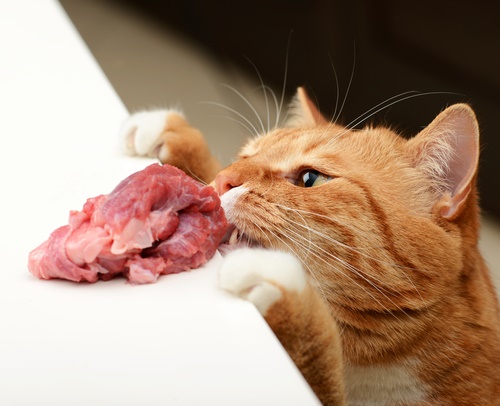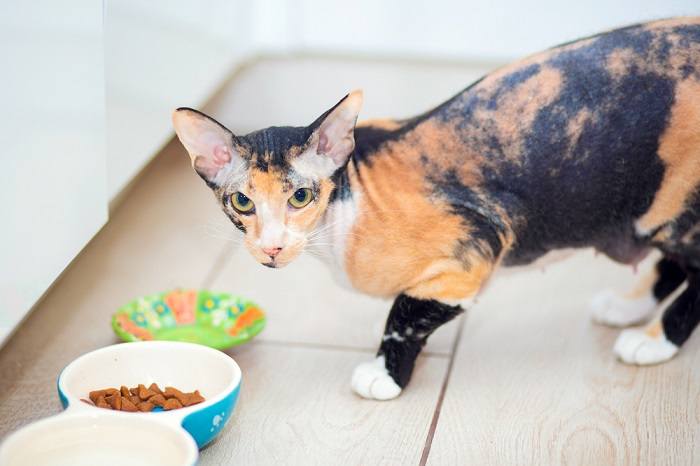
Grocery and pet stores have seemingly endless options of cat food. Have you ever stopped, though, to think about what a cat actually needs to eat?
You probably know that cats need to eat meat. But, how does that translate into the diet of a typical domestic house cat?
Let’s delve deeper into a cat’s need for meat.
Why Your Cat is an Obligate Carnivore

Cats are obligate carnivores, defined as animals who must have animal-based protein (i.e., meat) as the main part of their diet. Wild cats will hunt small prey, such as rodents, and large prey, like deer.
Domestic cats are remarkably similar to their wild counterparts. So, even though your cat loves lounging in a sunlit window for hours, they still have a strong hunting instinct and need meat as a major part of their diet.
Cats can produce a few nutrients on their own but rely on meat for many other essential nutrients, including those listed below:
- Vitamin A: Vitamin A is necessary for good vision, healthy skin, and immune functioning. Cats lack the enzyme to convert vitamin A to its active form, so they must eat meat to get active vitamin A.
- Arginine: Arginine is an amino acid, which is the building block of a protein. It is an essential amino acid for cats. Meat is the primary way that cats get arginine in their diet.
- Taurine: Taurine is another essential amino acid for cats. It plays important roles in heart functioning and vision. Taurine comes only from meat, so cats must eat meat to get it.
- Arachidonic acid: Arachidonic acid is a fatty acid that helps a cat’s body efficiently use fat and produce energy. Cats must eat meat to obtain arachidonic acid.
- Protein: Cats require lots of protein, and it must be animal-based protein. Proteins are essential for energy and many other bodily functions.
- Water: Like all other animals, cats need fresh, clean water.
Also Read: How Much Water Should a Cat Drink?
Cats have little to no need for carbohydrates. Interestingly, a cat’s digestive tract is shorter than that of a dog’s because their body doesn’t need to digest carbohydrates.
Cats occasionally eat plants or grass to help with digestion.
Diets for Domestic Cats

Of course, it’s not practical for indoor domestic cats to hunt prey. Commercially available cat food, formulated as dry, semi-moist or canned, provides cats with a nutritionally balanced and complete diet.
Dry foods are inexpensive, but are not always very digestible or even palatable for cats. Semi-moist foods are a little more expensive and have meat or meat by-products as their main ingredients. Moist foods are the most expensive, have the highest water content, and are generally most liked by cats; however, they might not be nutritionally complete.
When deciding on a cat food, look for the Association of American Feed Control Officials label, which indicates that the food meets the minimal nutritional requirements for a cat. Also, read the ingredients label; you want a food that lists an animal-based protein first.
Also Read: 10 Questionable Cat Food Ingredients to Avoid
Never feed your cat unsupervised raw meat, which has bacteria that could make your cat quite ill. Also, take extreme caution when you prepare homemade diets because as they are unlikely to be nutritionally balanced and complete without consulting an expert. Vegan and vegetarian diets are not appropriate for cats because they lack animal-based protein.
Cats can be finicky eaters. If you’re having trouble finding the right diet for your cat, your veterinarian can recommend some high-quality cat diets.
Bringing it Together
Cats are obligate carnivores and need meat. Choose a diet that will give your cat the nutrients they need, in the right proportions. If you need help choosing a diet, consult with your veterinarian.